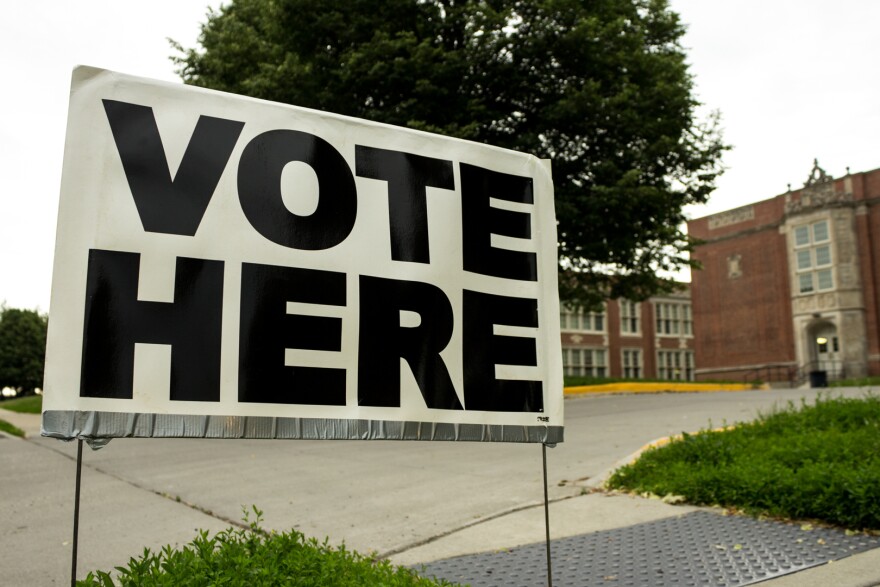On the heels of the June 2 primary election that saw record turnout during the COVID-19 pandemic with expanded mail-in voting, Iowa lawmakers passed two bills that have the potential to limit or slow the absentee voting process in November as the coronavirus continues to spread.
The first puts constraints on the secretary of state’s authority to change election processes during an emergency.
Republican Secretary of State Paul Pate used federal coronavirus relief funding to send absentee ballot request forms to all registered voters ahead of the primary election. Voters typically have to request or obtain the ballot request forms themselves. But Pate encouraged voting from home to keep voters and poll workers safe from coronavirus exposure. He also extended the early voting period from 29 days to 40 days.
Nearly 80 percent of Iowans who voted in the primary used absentee ballots. Iowa broke its record for turnout in a primary election by 81,641 votes.
A few days later, Senate Republicans moved to prohibit the secretary of state from doing another mass mailing of absentee ballot request forms.
But a bipartisan compromise in the House of Representatives resulted in the final bill, which Republican Gov. Kim Reynolds signed into law last week. Under the new law, the Legislative Council—a Republican-led group of 24 lawmakers—must approve the secretary of state’s plan for altering an election during an emergency.
"I come at this not in response to a particular piece of policy from the last election, but rather long-term stability of the office," said Rep. Bobby Kaufmann, R-Wilton. "This is about one individual not having unchecked power to change election law without the legislature's consultation."
While most House Democrats supported the bill, Senate Democrats did not, saying it still gives Republican lawmakers the ability to reject expanded mail-in voting during a pandemic.
“The Legislative Council has no business overriding another statewide elected official’s duties [and] responsibilities that are clearly outlined in Iowa law and in the administrative code,” said Sen. Pam Jochum, D-Dubuque.
Reynolds said Pate’s decision to send absentee ballot request forms to all registered voters was “fine.”
Republicans passed last-minute absentee ballot request changes
Contentious debates about absentee ballot requests broke out again and filled the final hours of the legislative session, when Republican lawmakers tacked a new election-related policy onto a budget bill. It would change the way county auditors process absentee ballot requests that arrive incomplete or with incorrect information.
Current law says the auditor must use “the best means available” to fix those issues, which often means the auditor checks the state’s voter registration database to complete the information and send the voter a ballot.
The new policy passed by Republicans at the very end of the legislative session prohibits county auditors from using the voter registration system to do that, and instead requires them to call and email those voters to complete the request form. If that doesn’t work, or if the voter didn’t provide their phone number or email address, the county auditor must use physical mail to get in touch with the voter.
“We have a lot of people that invert numbers as they get older,” said Roxanna Moritz, president of the Iowa State Association of County Auditors (ISACA). “They might miss a number on their address or they might invert their date of birth. We have a system that we’re able to look right at and tell that they inverted that number.”
Moritz said blocking local election officials from doing that will require more staff time to process ballot requests and add costs for the county. And for some voters, it could delay their receipt of a ballot.
Some Republican lawmakers said the bill is meant to prevent voter fraud.
“The intent of this is to ensure that the person that actually wants a ballot is the person that gets a ballot,” Rep. Kaufmann said. He said it’s more accurate to talk directly to the voter than to check the voter registration system.
But there is no evidence of widespread voter fraud in Iowa. A review of court data by the Cedar Rapids Gazette found 23 election misconduct convictions in the state over a five-year period.
ISACA, which is made up of Republican and Democrat election officials, has asked Reynolds to veto this proposed policy.
“The evidence doesn’t support the supposition that there is a problem that requires this remedy,” Moritz wrote in a letter to Reynolds on behalf of ISACA. “The real effect of this law will be to slow down a process that county auditors have refined to a high degree of efficiency and accuracy, as demonstrated in the recent primary election. As heavy as absentee voting was in the primary, with no definitive abatement of the pandemic, the numbers for the general election will probably dwarf that turnout.”
AARP Iowa and the League of Women Voters of Iowa have also asked Reynolds to veto the policy.
“We don’t know what the pandemic is going to be like by November,” said Terese Grant, president of the League of Women Voters of Iowa. “But all speculation says it could be even worse. Iowans need to be able to vote safely and securely, and I think this just puts an impediment to voting in Iowa that we don’t need at this time.”
The secretary of state’s office reported 82.5 percent of Democrats voting in the primary election used an absentee ballot, and 71.6 percent of Republicans used an absentee ballot.
Republican lawmakers also tried in 2017 to prohibit county auditors from using the voter registration system to help process absentee ballot requests, but a judge struck that down. If Reynolds signs this into law, it will likely be challenged in court.





